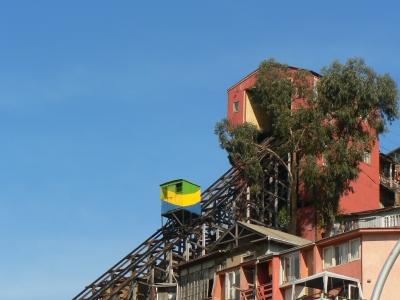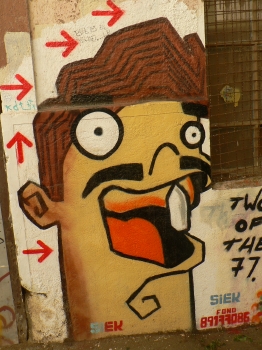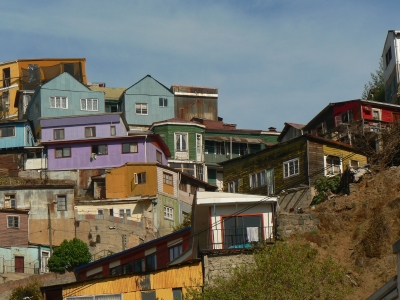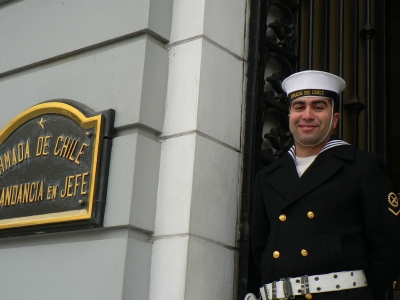|
 |
|
|
Travelog:
Chile
Wheels of Jesus Valparaiso Other Places: Brazil Argentina Bolivia Peru Ecuador Venezuela New Zealand Austrailia Indonesia Cambodia Laos Myannmar Nepal Tibet China Iran Ethiopia Kenya Malawi South Africa |
Valparaiso and the Fourth World
May 20th, 2006
Traveling, there are some places you fall quickly and stupidly in love with. Valparaiso, Chile's historical and once-again great port, sits in a protected cove North and West of Santiago. The lair of indominable poet Pablo Neruda, the city stubbornly crawls up steep hills that flank the ocean. It's a realm of cobblestones, plaster and tin -- shifting, crumbling and rusting in aesthetic concert. The patina of graceful aging elevates the cityabove its gritty port and often dusty streets. UNESCO flagged the entire municipality as a world heritage site. Pablo called her "the cleanest of the filthy cities" and as I wait to ride up to Cerro Concepcion on the city's oldest ascensor (hillside elevator), I am grinning like a fool and planning my next caress of her curving streets. Valparaiso is so endearing because it's fallen into my "fourth world." Traveling, really, is a cheap way to time travel. I don't claim the idea -- Neal Stevenson wrote, "the future is already here, it just isn't evenly distributed." Every community, every locale falls into beat with a certain era. Villages in India, no electricity (pre-1900), the simple woodfire stoves in Patagonian kitchens (1960), or Manhattan clubs with metrosexuals (2010). The fourth world, though it has its respective epoch, isn't about time, it's about uncorruptability. Charm and identity that are unique and endearing. Stubborn. At equilibrium but unassimilated. When you hear, "you should have seen Cinque Terre 20 years ago" or "Laos is the new Thailand", the speakers are grasping at moments they had in the fourth world. Before a place succumbs to massive influxes of tourist money and consumerism. When traveling, it is the only precious commodity. Tourism has tendrils, and constantly creeps outward. Whether or not a place can resist the temptation of easy money, it might, might just survive longer than Cancun. Sooner or later, every destination faces the all-important dilemna -- whether or not to sell t-shirts and key chains bearing its name. Usually, once that happens, this special kernel is lost. But not always. Some places are hardy and tough, and can resist. To visit, you can straddle the timewarp, and look both backward and forward, into a hopeful future, where locals have a real life that can sustain them. (Valpo, a fully modern city, doesn't suffer from tourism dependence.) Here's an example: though Valparaiso is famous for its paired elevator boxes that deliver residents up steep hills, a bit of new history caught my eye as well. In the middle of the city, on one of its prominent hills, sat the prison. In the prison, sat common and political criminals. Until 1999. The city closed down the prison, and a darker chapter of Latin American political encarcertation. Now, the "ex-carcel" has blossomed as a community art center, with dozens of non-profits, and even an "experimental circus". Despite the Renaissance, history isn't forgotten -- cells still wear magazine gals on their walls, fading and peeling slowly, undisturbed. Cell doors are open, in case you want to look backward in time, rather than forward. History and the city´s modern creative spirit mingle well.. like a good stew. It's not something I can find just anywhere. So, I'm sipping a cafe in the basement of a 1920s house, where a local has decided to set up an impromptu movie theater. Well, I just gotta smile, and hope I find more places that have been so lucky. |
Snaps:
(All Chile)
|
.gif)



